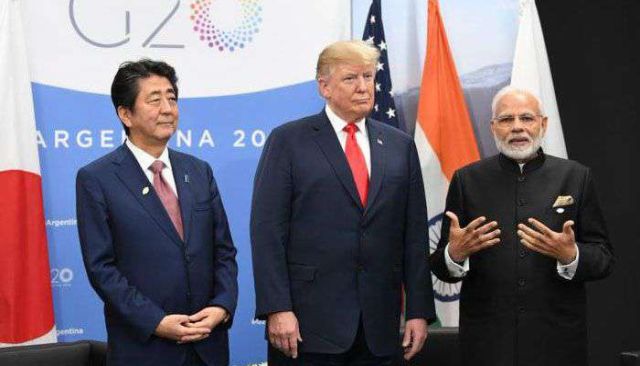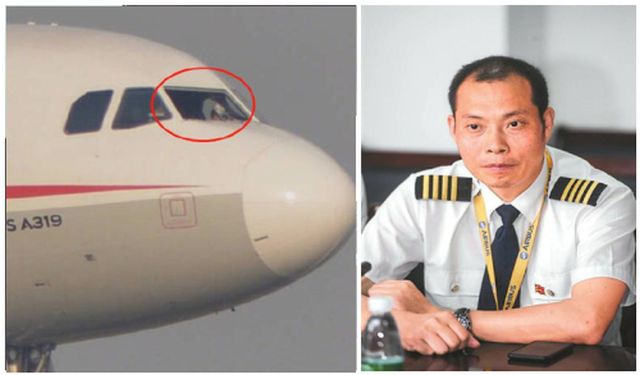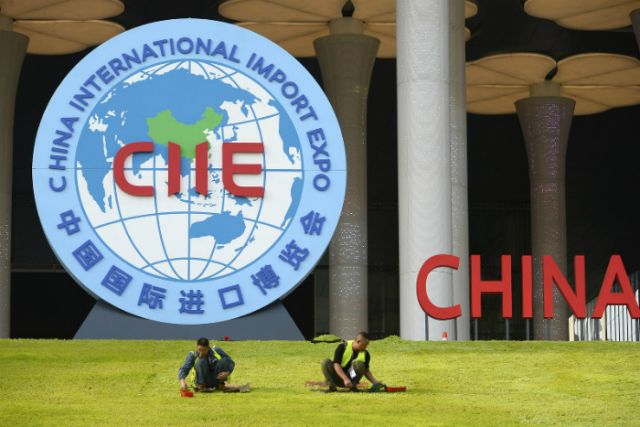
by Editor | May 25, 2021 | World
 By Gaurav Sharma,
By Gaurav Sharma,
Beijing : China on Monday reacted cautiously to the trilateral meet between India, Japan and the US on the sidelines of the just-concluded G20 summit, saying Beijing was okay to such a set-up if it did not disturb peace in the region.
Indian Prime Minister Narendra Modi, Japanese Prime Minister Shinzo Abe and US President Donald Trump had a meeting in Argentina’s Buenos Aires, an event which came against the backdrop of China’s rising influence.
The three countries are part of the so-called Quad, the fourth member being Australia.
Modi, Abe and Trump appealed for an open and inclusive Indo-Pacific region where the Chinese presence has steadily grown.
Responding to the meeting between the three leaders, Chinese Foreign Ministry spokesperson Geng Shuang said: “We remain open to normal cooperation among relevant parties.
“We hope such cooperation will promote mutual trust and cooperation in this region and play a constructive role in promoting the development of peace and prosperity in the region,” he added.
The first such trilateral was an extension of Japan and US bilateral and was dubbed as “JAI” — an acronym for Japan, America and India.
“The three leaders reaffirmed the importance of the Free and Open Indo-Pacific vision for global stability, prosperity and pledged to deepen trilateral cooperation,” India’s Foreign Ministry spokesperson Raveesh Kumar had said.
—IANS

by Editor | May 25, 2021 | Business Summit, Events, Social Round-up, World
 Port Moresby : Trade disputes and the competition for geopolitical influence in the Pacific between China and the US took centre stage at the Asia-Pacific Economic Cooperation (APEC) summit in Papua New Guinea on Saturday, where 21 member nations were gathered with the aim of drawing up a common trade area by 2020.
Port Moresby : Trade disputes and the competition for geopolitical influence in the Pacific between China and the US took centre stage at the Asia-Pacific Economic Cooperation (APEC) summit in Papua New Guinea on Saturday, where 21 member nations were gathered with the aim of drawing up a common trade area by 2020.
While Chinese President Xi Jinping reiterated his opinion that no country benefits from a trade war, US Vice President Mike Pence used his speech to warn Beijing of further sanctions if the Asian superpower does not end what he termed abusive trade practices, the BBC reported.
“History has shown that confrontation, whether in the form of a cold war, a hot war or a trade war, will produce no winners,” Xi told delegates gathered here at the summit in Port Moresby.
He advocated multilateral relations without egotistical agendas or protectionism, which he said were condemned to failure in what was interpreted as a thinly-veiled dig at the “America First” policies pursued by US President Donald Trump, who did not attend the APEC gathering.
“Attempts to erect barriers and cut close economic ties work against the laws of economics and the trends of history,” Xi said, adding that “this is a shortsighted approach and it is doomed to failure”.
Pence struck a more hawkish tone, although he prefixed his speech by saying the Trump administration admired Xi and China.
“In the President’s words, China’s taken advantage of the US for many, many years, and those days are over,” Pence said.
“As the President added, China has tremendous barriers, it has tremendous tariffs and, as we all know, their country engages in quotas, forced technology transfers, intellectual property theft and industrial subsidies on an unprecedented scale,” Pence went on.
“Such actions have actually contributed to a $375 billion trade deficit with the US last year alone,” he said.
He said Trump’s move in September to levy tariffs worth $250 billion on Chinese imports — to which China responded in kind, placing roughly $110 billion of its own tariffs against US imports — was in defence of US interests, but warned that Washington could double its tariffs if China does not adhere to commercial policies proposed by Washington.
“The US will not change course until China changes its ways,” Pence said.
He also took aim at China’s development programmes in the region, such as the Silk Road initiative that Beijing hopes will connect trade routes through Central Asia and into Europe, which Pence described as being of lower quality.
He also said that Chinese initiatives damaged the sovereignty of other nations, while US enterprises prioritized other countries’ sovereignty.
Founded in 1989, APEC accounts for 60 per cent of global GDP, more than half of global trade and constitutes a market of around 2.85 billion consumers, or roughly 40 per cent of the global population.
It aims to establish a free trade zone among the 21 member economies by 2020.
—IANS

by Editor | May 25, 2021 | World
 By Biswajit Choudhury,
By Biswajit Choudhury,
Shanghai : The first China International Import Expo (CIIE) that concluded here on Saturday can be called a success if only for its signal to the world that the second-largest economy will open up further in the face of protectionist, anti-globalising trends ruling in the developed world.
The material indicators of CIIE’s success also abounded, where over 400,000 local buyers had the opportunity to interact with more than 3,500 businesses from 172 countries. The gigantic exhibition complex was a beehive of activity with businesses signing thousands of deals and purchase agreements.
At the same time, the declaration of China’s further opening, on the 40th anniversary of its Deng Xiaoping-led 1978 liberalisation, appeared to find an echo in the results of the Congressional elections in the US, which has launched a trade war on the Asian nation by imposing tariffs on around half the Chinese imports into America. President Donald Trump has threatened to deepen the conflict and target all imports from China.
In his opening address at the Shanghai trade expo — whether under American pressure or otherwise — Chinese President Xi Jinping promised to lower import tariffs and make it easier for foreign companies to access China’s market. This holds promise for trading partners like India and the US which have massive trade deficits with China.
Declaring that “openness had become a trademark of China”, Xi said that his country “would continue to broaden market access”.
In an indirect reference to US protectionism, he said: “In a world of deepening economic globalisation, practices of the law of the jungle and winner takes all only represent a dead end. An inclusive growth for all is surely the right way forward.”
Xi also said that China would hasten negotiation process for both a China-European Union investment agreement and a regional China-Japan-South Korea free trade deal.
He announced that China’s import of goods and services were estimated to exceed $30 trillion and $10 trillion, respectively, in the next 15 years.
The showcasing of the Chinese market through an expo organised around the theme “New Era, Shared Future”, comes at a time when the country is striving to boost consumption in an attempt to transit away from years of manufacturing-led growth.
According to an official statement, companies that signed deals at the CIIE include multinationals like Volkswagen, Westinghouse Electric, ABB, Carnival, Rolls-Royce and Standard Chartered. American majors like General Motors and Google took part in the expo.
At the expo, Chinese e-commerce giants Alibaba and JD.com announced plans to import $200 billion and $14.4 billion of merchandise, respectively.
Beyond the billions of dollars of purchase agreements signed at the week-long CIIE, foreign businesses and observers spoke of the need for clarity on concrete steps that would facilitate longer-term market access in China.
Professor at Jawaharlal Nehru University’s Centre for East Asian Studies, Srikanth Kondapalli, an invitee to the CIIE Media and Think Tank Forum, told IANS here that countries which took part in the Shanghai expo now await the concretising of promises made to open up the economy.
“The world is now looking to see how the policy measures articulated by President Xi will be implemented in the near future,” he said.
Indian companies participated in the CIIE with the country pavilion focusing on key sectors such as food, agro products, pharmaceuticals, IT and ITES, tourism and services.
China is India’s largest trading partner and bilateral trade last year touched nearly $90 billion, while the trade deficit stood at over $63 billion.
India reiterated its concerns at the CIIE over the increasing trade deficit with China and asked Beijing to give Indian products more access to the Chinese market in the areas of pharmacy, agriculture and information technology.
An Indian embassy statement said that Commerce Secretary Anup Wadhawan, who attended the CIIIE and met here with China’s Vice Commerce Minister Wang Shouwen, told the Chinese minister that “areas such as agriculture products, pharmaceuticals, information technology services and tourism, in which India has proven strengths and significant global presence but a minuscule presence in China, need to be encouraged in bilateral trade.”
The statement also said that Wadhawan acknowledged the Chinese government’s efforts in clearing some of the market access issues for products such as rice and rapeseed meal, and expressed satisfaction over progress on soybean meal and pomegranate, among other commodities.
Foreign speakers at the media and think tank forum lauded China’s initiative on opening up and globalisation at a time when the revival in world economic growth is still at its beginnings.
“The spirit of cooperation has been put at risk by a vicious cycle of protectionism and economic setbacks. Global imbalances are challenging stability and economic growth,” former French Prime Minister Dominique Villepin said in his address.
Noting that the economic momentum had shifted away from the Western economies towards more “multi-polar growth”, Villepin called for urgent reform of multilateral institutions like the IMF and the WTO by granting more voting rights to countries like India and Russia.
Poland’s former Finance Minister Grzegorz Kolodko said the world is now witnessing the “crisis of neo-liberal capitalism…a crisis of the system, of views and policies. The contribution to new thinking is now coming from countries like China and others,” he said.
“Globalisation has not been inclusive in recent times but has been going towards neo-liberalsm, enriching the few, including the middle class. So what has emerged, in reaction, is neo-nationalism,” he added.
With the success of the first edition of CIIE, China is already planning a second edtion of the Shanghai expo to be held next year.
(Biswajit Choudhury visited the CIIE at the invitation of China’s State Council Information Office. He can be reached at biswajit.c@ians.in )
—IANS

by Editor | May 25, 2021 | World
 Beijing : A pilot who made a successful emergency landing in May has been honoured as one of China’s 20 “most beautiful veterans” of 2018, authorities announced on Sunday.
Beijing : A pilot who made a successful emergency landing in May has been honoured as one of China’s 20 “most beautiful veterans” of 2018, authorities announced on Sunday.
Liu Chuanjian, a 41-year-old Sichuan Airlines pilot, was known for his professional reaction in making an emergency landing after the cockpit window broke during flight, ensuring the safety of all the 119 people on board, reports Xinhua news agency.
Others were honoured either for their role in leading villagers out of poverty or safeguarding people’s property and life safety when they were no longer serving in the army, according to the Publicity Department of the Communist Party of China (CPC) Central Committee and the Ministry of Veterans Affairs.
Wang Qirong, 61, spent 36 years guarding a cemetery where more than 900 martyrs were buried in Napo county in Guangxi Zhuang region.
Wang Guiwu, 59, has been looking after 16 mothers whose children lost their lives when combating floods in 1998 and participating in earthquake relief operations in 2008.
He also donated 1 million yuan ($144,246) to build a school in his hometown.
The veterans received certificates and videos of their meritorious deeds were displayed at the honouring ceremony.
—IANS

by Editor | May 25, 2021 | Business Summit, Events, World
 Beijing : Chinese President Xi Jinping announced the opening of the world’s first import-themed national-level expo here on Monday, calling it a “trail-blazing” move in the history of international trade development.
Beijing : Chinese President Xi Jinping announced the opening of the world’s first import-themed national-level expo here on Monday, calling it a “trail-blazing” move in the history of international trade development.
A total of 172 countries, regions and international organisations from five continents will showcase their development achievements and international image at the first China International Import Expo (CIIE), reports Xinhua news agency.
More than 3,600 companies from different countries will hold discussions and seek common development with over 400,000 purchasers from China and overseas.
The CIIE is “a major policy for China to push for a new round of high-level opening-up and a major measure for China to take the initiative to open its market to the world”, Xi said when delivering a keynote speech at the opening ceremony.
He underscored the role of economic globalization, saying that it is “an irreversible historical trend” and provides strong momentum for world economic development.
“All countries should be committed to opening up and oppose protectionism and unilateralism in a clear-cut stand,” Xi said, calling for joint efforts to build an open world economy.
The fair will feature various quality exhibits ranging from German machine tools, Japanese robots and US medical equipment to Australian wine, Brazilian farm produce and South Sudanese handicrafts.
With the slogan “New Era, Shared Future”, the expo is the brainchild of Xi and is set to become a platform for win-win economic cooperation and a landmark project in the country’s higher-level opening up.
China will stimulate the potential for increased imports, continue to broaden market access, foster a world-class business environment, explore new horizons of opening up, and promote international cooperation at multilateral and bilateral levels, Xi said.
The expo comes at an inflection point as China transitions to high-quality development and shifts from the world’s workshop to the world’s market, with the world’s biggest middle-income population demanding higher-quality consumer products.
Xi announced that China’s imported goods and services were estimated to exceed $30 trillion and $10 trillion, respectively, in the next 15 years.
China has been the world’s second largest merchandise importer for nine consecutive years.
This year marks the 40th anniversary of China’s reform and opening up, and has seen a flurry of concrete measures taken by the country to open its doors wider.
“China will not close its door to the world and will only become more and more open,” Xi added.
—IANS





